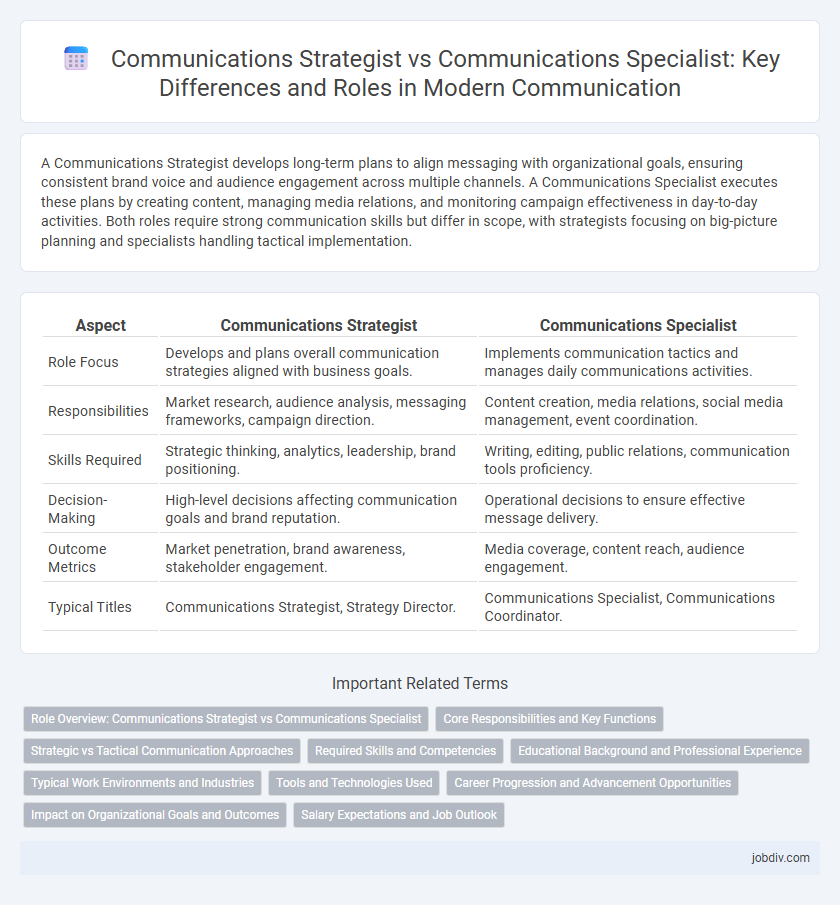A Communications Strategist develops long-term plans to align messaging with organizational goals, ensuring consistent brand voice and audience engagement across multiple channels. A Communications Specialist executes these plans by creating content, managing media relations, and monitoring campaign effectiveness in day-to-day activities. Both roles require strong communication skills but differ in scope, with strategists focusing on big-picture planning and specialists handling tactical implementation.
Table of Comparison
| Aspect | Communications Strategist | Communications Specialist |
|---|---|---|
| Role Focus | Develops and plans overall communication strategies aligned with business goals. | Implements communication tactics and manages daily communications activities. |
| Responsibilities | Market research, audience analysis, messaging frameworks, campaign direction. | Content creation, media relations, social media management, event coordination. |
| Skills Required | Strategic thinking, analytics, leadership, brand positioning. | Writing, editing, public relations, communication tools proficiency. |
| Decision-Making | High-level decisions affecting communication goals and brand reputation. | Operational decisions to ensure effective message delivery. |
| Outcome Metrics | Market penetration, brand awareness, stakeholder engagement. | Media coverage, content reach, audience engagement. |
| Typical Titles | Communications Strategist, Strategy Director. | Communications Specialist, Communications Coordinator. |
Role Overview: Communications Strategist vs Communications Specialist
A Communications Strategist develops comprehensive communication plans that align with organizational goals, focusing on long-term messaging, brand positioning, and audience engagement strategies. In contrast, a Communications Specialist executes specific communication tasks such as writing press releases, managing social media, and coordinating media outreach to support the strategist's overarching plan. The strategist's role is analytical and visionary, whereas the specialist's role is operational and tactical, ensuring effective message delivery across various channels.
Core Responsibilities and Key Functions
Communications Strategists develop comprehensive communication plans, aligning messaging with organizational goals and overseeing brand positioning across multiple channels. Communications Specialists execute these plans by creating content, managing media relations, and ensuring consistent messaging to target audiences. While Strategists focus on high-level planning and analysis, Specialists concentrate on tactical implementation and audience engagement.
Strategic vs Tactical Communication Approaches
Communications Strategists develop high-level plans aligning messaging with organizational goals, emphasizing long-term brand positioning and audience engagement through data-driven insights. Communications Specialists execute these strategies by managing day-to-day communications, crafting targeted content, and ensuring consistent messaging across channels. The strategist role prioritizes strategic planning and analysis, while the specialist focuses on tactical implementation and operational communication tasks.
Required Skills and Competencies
Communications strategists require advanced skills in market analysis, brand management, and campaign development, emphasizing strategic planning and cross-channel coordination. Communications specialists focus on strong writing, media relations, and content creation, excelling in tactical execution and audience engagement. Mastery of digital tools, data interpretation, and stakeholder communication is essential for both roles, with strategists prioritizing long-term objectives and specialists delivering targeted messaging.
Educational Background and Professional Experience
Communications strategists typically hold advanced degrees in communications, public relations, or marketing, complemented by extensive experience in campaign development and leadership roles. Communications specialists often have bachelor's degrees in related fields and concentrate on executing communication plans, media relations, and content creation. Professionals in both roles benefit from internships and certifications, but strategists usually demonstrate a broader scope of project management and strategic planning expertise.
Typical Work Environments and Industries
Communications strategists often work in corporate headquarters, advertising agencies, or public relations firms, focusing on high-level campaign planning across diverse industries such as technology, healthcare, and finance. Communications specialists typically operate within specific departments like marketing or internal communications in sectors including education, government, and non-profits, where they execute targeted messaging and content creation. Both roles require adapting communication tactics to fit the unique demands of environments ranging from fast-paced media companies to structured institutional settings.
Tools and Technologies Used
Communications Strategists leverage advanced analytics platforms, customer relationship management (CRM) systems, and strategic planning software to design and optimize comprehensive communication campaigns. Communications Specialists focus on content management systems (CMS), social media scheduling tools, and graphic design software to execute and maintain daily communication activities effectively. Both roles utilize digital communication channels but vary in their emphasis on strategic versus tactical technology applications.
Career Progression and Advancement Opportunities
A Communications Strategist typically holds a senior role focused on developing long-term communication plans and aligning messaging with organizational goals, offering greater leadership and decision-making responsibilities. In contrast, a Communications Specialist usually manages day-to-day communication tasks such as content creation and media relations, serving as a foundational role with opportunities to gain experience. Career progression from Specialist to Strategist often involves acquiring strategic planning skills, industry knowledge, and leadership experience, enabling advancement into higher-level positions with increased influence and compensation.
Impact on Organizational Goals and Outcomes
Communications strategists drive organizational goals by crafting comprehensive communication plans that align with long-term objectives, ensuring brand consistency and stakeholder engagement across multiple channels. Communications specialists execute these plans by creating tailored content and managing day-to-day communications, directly influencing audience perception and operational efficiency. Both roles significantly impact organizational outcomes by integrating strategic vision with tactical implementation to enhance reputation, stakeholder trust, and business growth.
Salary Expectations and Job Outlook
Communications Strategists typically command higher salaries than Communications Specialists, with average annual earnings ranging from $75,000 to $110,000 depending on experience and industry, while Specialists often earn between $50,000 and $70,000. Job outlook for Communications Strategists is strong, driven by growing demand for strategic messaging and brand management, whereas Communications Specialists face steady growth primarily in support roles and content creation. Both roles benefit from digital communication skills, but Strategists are increasingly sought for leadership positions focused on long-term communication planning and stakeholder engagement.
Communications Strategist vs Communications Specialist Infographic

 jobdiv.com
jobdiv.com